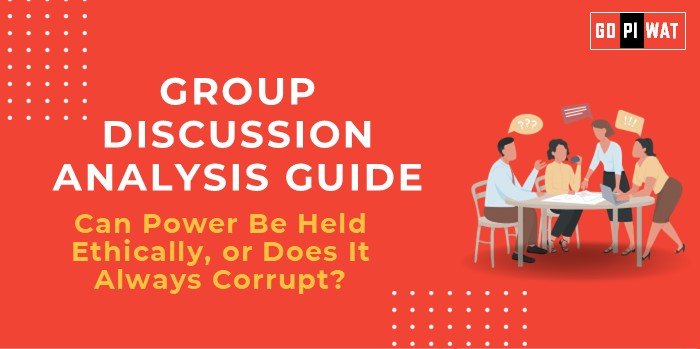📋 Group Discussion Analysis Guide: Can Power Be Held Ethically, or Does It Always Corrupt?
🌐 Introduction to the Topic
Opening Context: The relationship between power and ethics has been a central question in philosophy and politics, dating back to Plato and Machiavelli. In modern times, scandals involving misuse of authority continually bring this debate into public focus, making it highly relevant for B-school discussions.
Topic Background: Philosophical inquiry often grapples with the idea that “absolute power corrupts absolutely.” However, counterarguments exist, suggesting ethical frameworks and accountability mechanisms can ensure power is wielded justly. This topic delves into human nature, organizational ethics, and societal checks on authority.
📊 Quick Facts and Key Statistics
- 📉 Global Corruption Perception Index (2023): 124 out of 180 countries rank below average, emphasizing widespread misuse of power.
- 👩💼 Gender Leadership Gap: Women represent only 29% of global political leadership, reflecting unequal access to power.
- 📣 Whistleblowing Impact: Organizations with effective whistleblowing policies report a 40% reduction in unethical practices.
- 📜 Historical Data: Over 70% of corporate fraud cases involve misuse of authority by senior executives.
👥 Stakeholders and Their Roles
- 🏛️ Governments: Ensure legal frameworks and judicial accountability.
- 💼 Corporates: Foster ethical leadership and transparency.
- 🌍 Civil Society: Act as watchdogs against power misuse.
- 📰 Media: Highlight corruption and inform the public.
- 👥 Individuals: Emphasize values and integrity in decision-making.
🏆 Achievements and Challenges
✨ Achievements:
- ✔️ Ethical Governance Models: Scandinavian countries rank top on transparency and governance metrics.
- 🤝 Corporate Social Responsibility (CSR): Promotes ethical use of business influence for societal benefit.
- 📢 Impact of Activism: Civil movements have successfully led to policy reforms (e.g., whistleblower protections).
⚠️ Challenges:
- 🧠 Human Psychology: Power often triggers entitlement and reduces empathy.
- ⚖️ Systemic Inequalities: Power structures tend to perpetuate privilege and marginalize others.
- 🔍 Accountability Issues: Weak oversight mechanisms enable unchecked misuse of authority.
🌐 Global Comparisons:
- 🇳🇴 Success: Nordic nations demonstrate ethical power structures through democratic transparency.
- 🇺🇸 Challenges: Cases like the Watergate Scandal in the U.S. highlight risks of unchecked authority.
📖 Case Studies:
- 🇮🇳 India: Lokpal Act aimed to reduce corruption but faces implementation gaps.
- 🇿🇦 South Africa: The Truth and Reconciliation Commission, showcasing ethical leadership in post-apartheid governance.
💬 Structured Arguments for Discussion
- ✔️ Supporting Stance: “Power can be held ethically with strong systems of accountability and moral leadership.”
- ❌ Opposing Stance: “History and psychology suggest that power, even with checks, leads to corruption.”
- ⚖️ Balanced Perspective: “While power often leads to misuse, systems like CSR and democratic governance demonstrate ethical possibilities.”
🛠️ Effective Discussion Approaches
- 🎯 Opening Approaches:
- 💬 Quote-Based: “As Lord Acton stated, ‘Power corrupts; absolute power corrupts absolutely.'”
- 📊 Statistical Hook: “Over 70% of global leadership scandals involve ethical violations.”
- 📖 Philosophical Angle: “Plato argued that only philosopher-kings, driven by wisdom, could hold power ethically.”
- 🔄 Counter-Argument Handling:
- Highlight systemic successes (e.g., Nordic countries).
- Use psychological theories (e.g., the Milgram Experiment) to discuss ethical fallibility.
- Suggest reforms like transparency mandates and democratic oversight.
🔍 Strategic Analysis of Strengths and Weaknesses
- 💪 Strengths: Ethical frameworks, CSR initiatives, and democratic institutions.
- ⚡ Weaknesses: Psychological tendencies, systemic corruption, and weak oversight.
- 🌟 Opportunities: Leveraging AI for transparency, enhancing global governance models.
- ⚔️ Threats: Populist regimes, digital surveillance misuse, and societal apathy.
📚 Connecting with B-School Applications
- 🌍 Real-World Applications: Integrating ethics into financial audits, governance courses, and leadership training.
- ❓ Sample Interview Questions:
- “Can power dynamics in organizations ever be neutral?”
- “How can MBA graduates ensure ethical leadership in corporate roles?”
- 💡 Insights for B-School Students:
- Ethical leadership enhances stakeholder trust.
- Awareness of power’s psychological effects aids in self-regulation.
- Lessons from global governance enrich strategic thinking.


